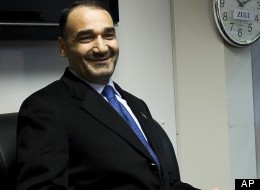Atta Muhammad Noor, Afghan Governor, Criticizes U.S. Exit Plan

MAZAR-E-SHARIF, Afghanistan -- Atta Muhammad Noor, a former Northern Alliance warlord who many consider to be the strongest governor in Afghanistan, is the kind of longstanding ally American officials would love to comfortably count on as they plan their withdrawal from the decade-old war here.
So it may sting a little to hear Noor lash out about the American exit strategy, and especially the U.S.-supported plan to bring the Taliban to the negotiating table, before a room full of American military officers.
"The current peace process as conducted by our government and by the U.S., with their meetings in Qatar, I don't think it can lead to a good outcome," Noor said last week in a conversation with a small gathering of reporters at his estate in Mazar. The gathering was organized and attended by a half-dozen coalition military officials. "It will be very difficult to sit at the same table with the leaders of the Taliban."
Noor's complaint may not be unexpected -- the idea that ex-Northern Alliance leaders would resist reconciliation talks with their ideological and military arch-enemies, the Taliban, is hardly surprising.
But it also clashes with recent American policy, which has focused on working behind-the-scenes to bring the Taliban back to peace talks. The hope, analysts and officials say, is that if a political balance can be struck between the insurgents and the government of President Hamid Karzai, the U.S. may be able to draw down its military presence by the end of 2014 without precipitating a new round of civil conflict.
If so, the political rebellion of the governors and warlords of the North, many of whom fought side-by-side with American special forces in the 2001 overthrow of the Taliban, could be a deeply complicating circumstance for the U.S. exit plan.
"I share the belief with my father that America’s Afghan strategy is shortsighted and probably based on domestic rather than strategic considerations," wrote Abdul Matin Bek, the son of a recently slain Northern tribal leader, who had fought with the Americans against the Taliban, in a January New York Times op-ed that captured the sentiment. "As Afghans, we rarely understand U.S. policy. One day the U.S. military declares the Taliban the enemy, the next day they’re willing to make peace. Does this policy reflect the realities on the ground? Is it a winning strategy?"
Back on topic.
The small political group called the Northern Alliance is composed of sell out Shiite afghans.
While almost all of the rest of Afghanistan is Sunni muslims; and that includes the Taliban.
So of course this Northern Alliance warlord is running scared and doesn't like the U.S. plan.
Cause when the American's leave; and hand over the keys to the Taliban; he is going to be in a world of hurt.

Islime is the religion of peace, no?

Well, maybe, no, after all


Iran Iraq War, 1 million dead
Lebanese Civil War, 250,000 dead
Algerian Civl War: 300,000 dead
Bangladesh Civil War: 500,000 dead
Black Sept., Jordan's King Hussein murders, expells 80,000 Palestinians
Syrian army kills 20,000 Syrians at Hama
Iraq gases hundreds of thousands of Kurds
1400 year conflict between Sunnis and Shiites
Fratricide between Hamas and Fatah
Syria/Hizballah assassinate Lebanese PM Rafik Hariri
Alexis de Toqueville...
I studied the Koran a great deal. I came away from that study with the conviction there have been few religions in the world as deadly to men as that of Muhammad. So far as I can see, it is the principal cause of the decadence so visible today in the Muslim world and, though less absurd than the polytheism of old, its social and political tendencies are in my opinion to be feared, and I therefore regard it as a form of decadence rather than a form of progress in relation to paganism itself.


